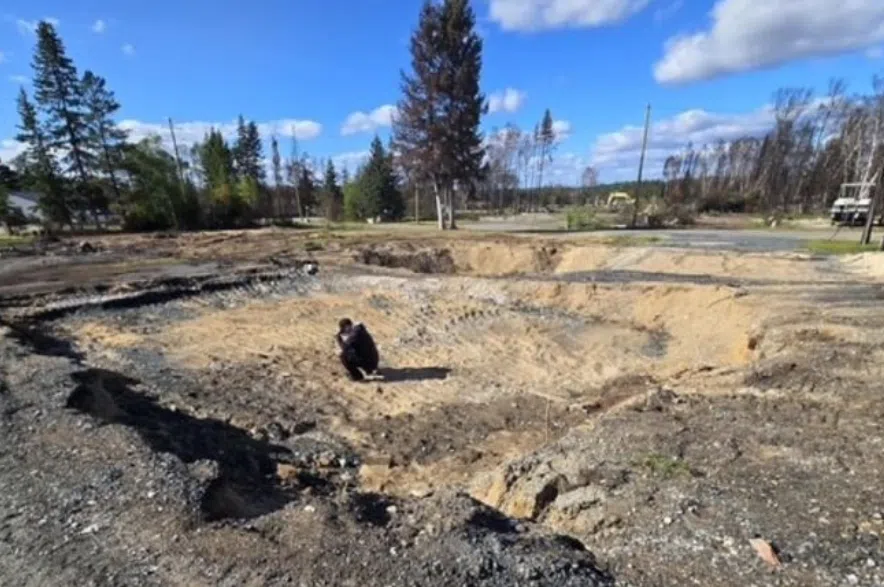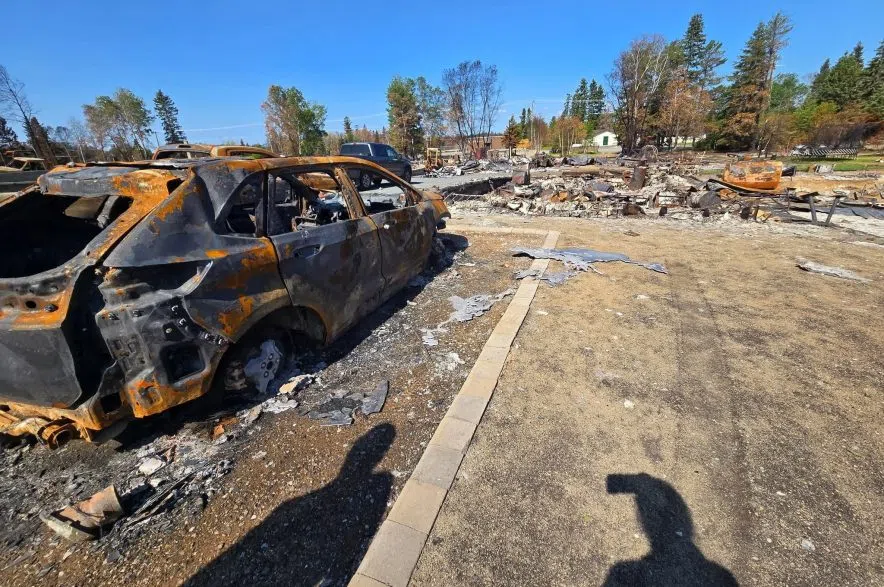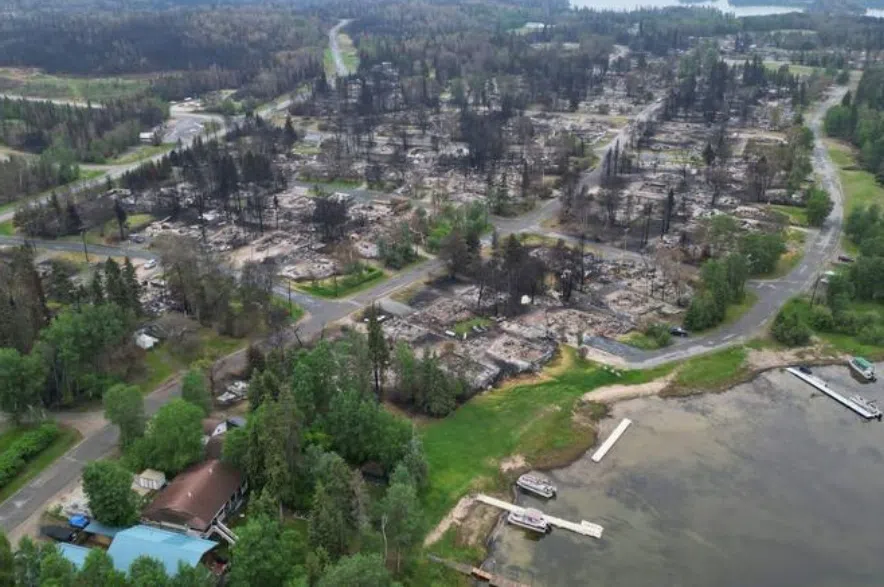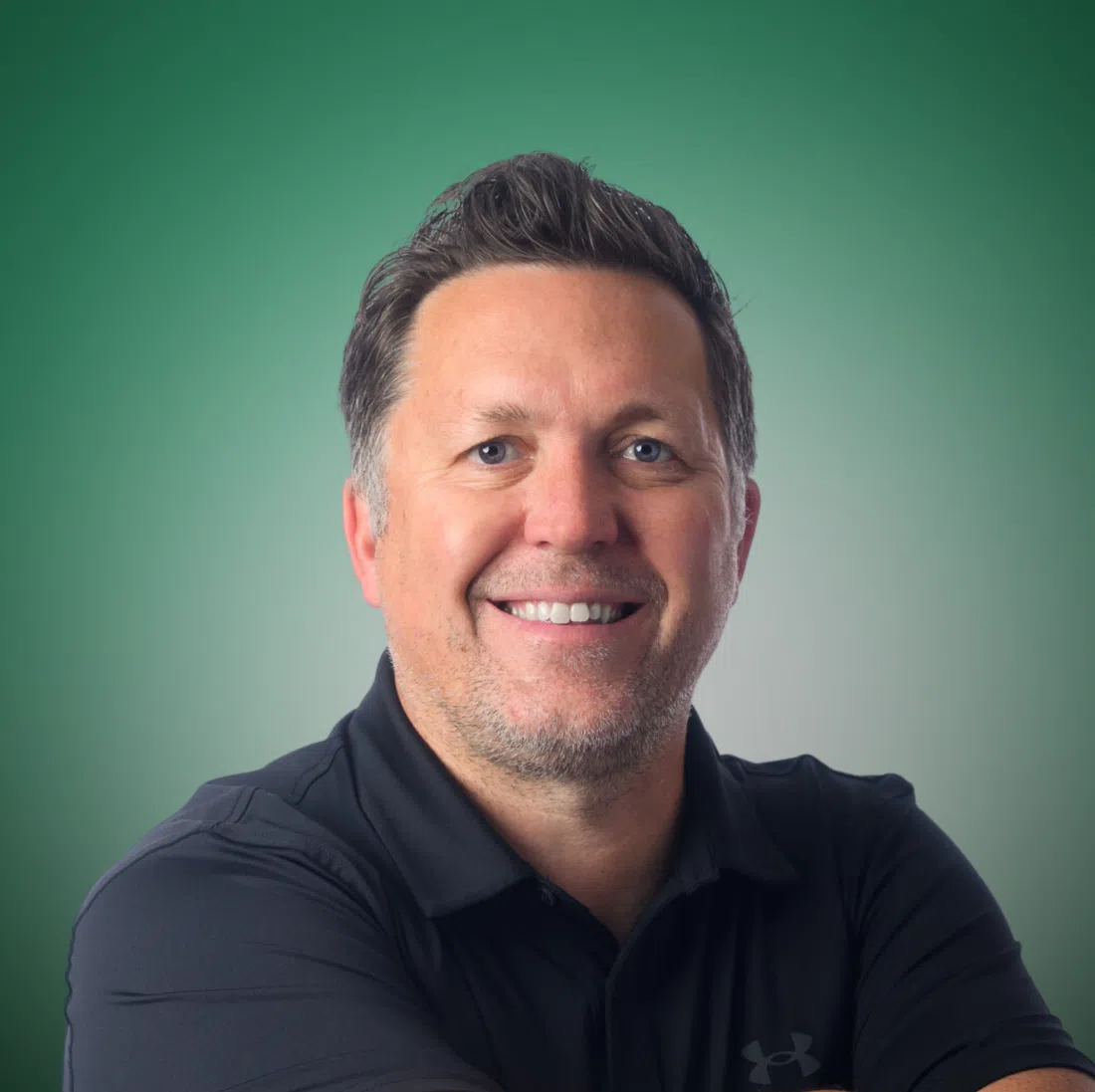When Dustin Trumbley looks into the hole in the ground where his home used to sit in Denare Beach, he feels like throwing up.
The stress of the impact caused by devastating wildfires in his community has started to manifest itself physically.
Read more:
- Call to drop PST on labour to help communities rebuild after devastating wildfires
- Memories, valuables and hope found in Denare Beach wildfire ashes
- ‘Survival mode’: Denare Beach evacuee reflects on losing home days before her due date
“It feels like we don’t matter up here. It’s just an awful feeling. I don’t sleep well at night. None of us are,” said Trumbley. “I’m a mental wreck.”
In addition to being his family’s home, it was also the base of his fiancée’s business. They had to postpone their summer wedding to rebuild.
The state of his life right now, he said, is anything but excellent.
That’s why he and other residents of Denare Beach took offence earlier this week to comments made by the Saskatchewan Public Safety Agency (SPSA).
During a news conference, vice president of operations Steve Roberts was asked how he would grade the wildfire response this year. He acknowledged the devastation at Denare Beach – something the SPSA has done frequently in it’s wildfire updates – but said considering how many other communities were impacted by raging wildfires across the province, the success rate to protect lives and properties was extraordinary.
“I think they need to be more careful with their words because they’re hurting a lot of people when they say they think they did everything they can do and that the province as a whole is a success story. Those words are hitting and impacting us in Denare Beach in a very awful way.”
Trumbley admits he’s been hyper-focused with the government’s response to Denare Beach – in part because he’s worried about wildfires in the future.
“Mother Nature does what she wants to do – we’re just in the way, I’ve always said that…but knowing they would properly protect our assets would make me sleep better at night,” said Trumbley.
“Maybe seeing some equipment or updates on what they’re going to do; get water bombers ready instead of leaving them on the tarmac since winter. You know all this stuff would, I think, make people rest easy at night.”
What’s helping him move forward is support from a mental health professional. He started online therapy and is encouraging other wildfire victims to do the same.
“I heard there is some vacancy in Creighton for mental health therapy. I would urge everybody to go – even if it’s just one phone call or one talk just to get a coping mechanism and how to deal with this.”
Lorna Gilbert, owner of Heartt Family Therapy in Prince Albert, has over 30 years of practice as a masters level registered social worker.
She said often people think of loss in terms of someone passing away or a divorce, but she said the loss of a home is just as significant.
“Grief is physical. It isn’t just an emotional thing. We hear it, feel it to the very fibre of our being,” said Gilbert.
“In dealing with this, some people may not understand and say things like ‘Oh well, it’s just a building.’ But it’s many things to people – so sometimes needing the support to have someone to understand exactly what you’re going through and to validate those really difficult feelings and difficult losses without judgement, and also someone who can help others to know what’s normal can be very useful.
“Grief is a process. It isn’t a short process, but it’s a very necessary process.”
Trumbley said he isn’t looking for an apology from the SPSA , but he wants reassurance they’ll be better prepared to respond with resources in the future, especially as he begins to rebuild his home.
“We need answers, and we’ve got nothing…not a reply from anybody. It’s just so disheartening.”
For mental health help in Saskatchewan people can contact:
- 9-8-8: National Suicide Prevention and Mental Health Crisis Hotline – Dial or text 9-8-8; 24/7 voice or text support for mental health crisis and suicide prevention. Visit 988.ca for more information.
- Call HealthLine at 811.
- Call 911 if someone is at risk of harming themselves or others.
- Call emergency crisis hotlines or general counselling.
- Visit Counselling Connect Saskatchewan for free access to rapid access counselling sessions.
- Contact the University of Regina Online Therapy Clinic.
- Call the French-language TAO Tel-Aide Helpline at 1-800- 567-9699. TAO Tel-Aide provides free and confidential telephone services 24/7 for French-speaking people experiencing psychological distress and in need of emotional support.
- Contact Hope for Wellness, a national 24/7 resource for all Indigenous people across Canada. Call 1-855-242-3310.
- Call Kids Help Phone – Offers professional counselling, information and referrals. Phone 1-800-668-6868, text 686868 or chat online. It’s confidential, free and available 24/7.
- Call the Farm Stress Line
Read more:













